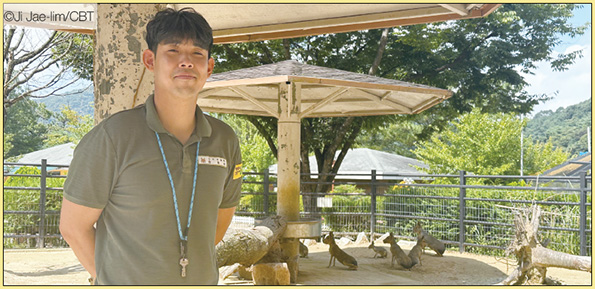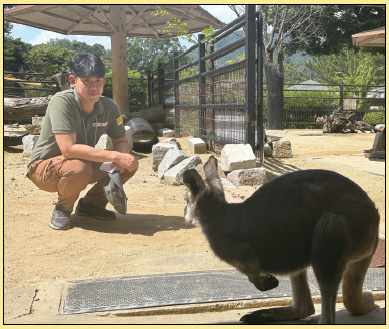
This summer, there was an accident that an escaped lioness from a private farm in Goryeong-gun had been shot dead. It will come as no surprise that the public showed a very negative perspective upon the shooting of a lioness and questioned the practice of breeding animals in captivity and the related welfare ethics. Therefore, CBT visited the Cheongju Zoo, located in Sangdang-gu, Cheongju-si, and met animal welfare officer, Gwon Hyuk-bum to talk about the animal welfare officer’s job, the relationship between the officer and the animals and garnered some advice for students who may be seriously concerned about the welfare of animals in captivity.

Gwon Hyuk-bum has been working at Cheongju Zoo for 9 years, and he is in charge of taking care of various animals.
Before the interview, when the CBT made a call to fix a date, the officer on duty told the CBT ‘we do not use the word zookeepers anymore. I would appreciate it if you call us animal welfare officers.’ Is there any reason for changing the job title?
Before changing the job title, there were many discussions in many zoos all over Korea. Because the word “zookeeper” has been in use for long time presentively, and it was hard to find any other options, we simply used the word “zookeeper” without replacing it. However, even though the name is just a name, the purpose of using a word should contain the full extent of everything we do to and for the animals. Since this includes caring, welfare and training, we changed the name to “animal welfare officer.”
The CBT found the section ‘a day in the life of a zookeeper’ on the Cheongju Zoo website. Please explain about the daily tasks that animal welfare officers do in more detail.
What is shown on the website looks very simple and easy. First, when we get to the office, we check each animals’ condition. When we open the gate and enter the cage to see their states, we can recognize each animal’s different behavioral patterns. The difference in behavior of nocturnal and diurnal animals is natural, even though it has the same driving force. Behavior may vary depending on the presence or absence of animal workers. For example, there are some animals waiting at the window, anticipating the worker approaching just by the sound, while some other animals are hiding or waiting a long distance away. We observe all these various patterns and we can deduce their health conditions based on deviations in their behavior. If the animals are behaving out of sorts, we consider taking them to vets. Most of the morning’s works are mainly preparing meals for animals, checking their health conditions, and cleaning the inside of cages.
In the afternoon, we do some administrative work or animal training. However, until a few years ago, the training focused on animals performing for the visitors, but these days, we focus on training that can fulfill the happiness and improve the health and wellbeing of the animals. The training helps animals to undergo medical treatment unreluctantly like getting on a scale by themselves. Furthermore, we often hide snacks and foods here and there for behavior enrichment, which allows the animals to engage in activities that would usually be done in the wild. We also construct playgrounds or sports equipments like cat towers for the animals to climb on.
When the CBT were doing preliminary research, the reporter saw a short cartoon on Instagram explaining that animal welfare officers in certain zoos take care of specific animals by different species like reptiles, amphibians, etc. How does this work in Cheongju Zoo?
In the past, we sorted the animals under mammals and birds. However, the system had changed a few years ago, now many animal welfare officers take care of various animals comprehensively. As an exception to the rule, predators such as lions and wildcats are managed separately. The advantage is that we can get input from more specialists on the welfare of different animals. However, it also can be a disadvantage as each officers think animals’ routine differently. Because this leads directly to animals’ health, the communication between workers is very important.
There are various endangered wild animals in Cheongju Zoo, such as tigers, eagles, Asiatic black bears, and cranes, etc. In addition, Cheongju Zoo has been selected for a project conserving national domestic animals this April and it is expected to lead in saving and protecting these animals. What can animal welfare officers do to contribute to this project?
The project is still in the preparation stages, but nothing has been finalized. However, if rescued animals are brought to Cheongju Zoo, the ideal process is to release them after adequate treatment and training. I think that it is important to expand cooperation with The Wildlife Center of Chungbuk, which we are affiliated with. Also, precise medical care will be possible in the animal hospital, which is now consturting within the zoo. Animals would be transferred to the rescue center for release as soon as they are ready. If the understanding of the overall system for rescue-treatment-release increases, Cheongju Zoo would rescue and release animals independently.
However, in the case of animals that cannot be released for whatever reason, the rescue center will have no choice but to administer euthanasia. In such cases, we would transfer them to our zoo for protection and use them as educational resources to inform visitors. It would be a meaningful opportunity to inform the public of some of the tough challenges that wild animals face, such as being hit by traffic. Nevertheless, if the rescue center reaches its capacity, we have no choice but to euthanize animals. If it is possible to protect these animals along with other animals in our zoo, that would be the best option.
Recently, the lioness that escaped from a private farm was shot dead, and there has been a discussion about the ethical issues of keeping animals in zoos. Indeed, such incidents have occasionally occurred not only in private farms but also in other zoos. What can officers and public do to ensure a better environment for animals in captivity?
Personally, I believe that situations like this can happen to me because I am only human. Mistakes and accidents can happen, despite our best efforts. In that sense, forgetting to properly lock the lion’s cage, is similar to forgetting to turn off the gas valve or lock the house door. However, this does not justify the mistakes and accidents that occur. From a systems and security perspective, it would be better to enhance measures that are already in place. Nonetheless, foolproof equipment is not available at this time, so we rely on multiple checks by animal welfare officers. I think it would be great if there were more tools and equipments to improve the current system like an alarm system that can detect an open door. Hopefully, those tools will be invented soon. In the meantime, enhancing security features making up for human weakness is essentially important now.
Do you think the aggressive behavior of animals that has escaped is a negative reaction to their new surroundings?
Escaped animals are literally like “a baby in the woods,” so it is their natural instinct to become sensitive and aggressive in unfamiliar surroundings. Animals cannot process all the various stimuli of society in an instance after escaping. Unfortunately, the animals might grow accustomed to, and feel comfortable in a cage or fenced off from humans. That is why animal welfare officers usually train with a fence. From the perspective of animals, being exposed to a new world and overwhelming stimuli like artificial sounds or large structures without a fence can make them behave aggressively.

Why did you choose an animal welfare officer as your occupation, and have your thoughts changed significantly from when you first chose this path?
Being an animal welfare officer was my childhood dream, so I chose a related major in university. However, when I was in college, I held some stereotypes, resulting from a shallow understanding of what it means to be an animal welfare officer, and consequently I went through a period of confusion and frustration. Nevertheless, since it had been my childhood dream, and I believed it was what I wanted to do and what I could do best, I put my mind to it and started again. When I was a child, my dream was to be close to animals and see them happy. As a matter of fact, the reality of my job has some differences from those childhood dreams. However, despite many things to take care of, I think that the main motivation still remains. I am fairly satisfied with my occupation.
Lastly, do you have any lessons for students who have a dream of becoming an animal welfare officer?
I give lectures to students on occasion. I strive to not only introduce my job but also provide practical information about the realities, exactly because I held some stereotypes due to a lack of understanding, and almost gave up. It would be better to consider about a certain career, after knowing the realities. Due to the lack of demand of animal welfare officers, many people give up their career, even though this occupation is cut out for them. I try to inform students of this reality and urge them that if they are interested in this path, they should visit local zoos for career counseling. Actually, high school students sometimes came and asked some questions. Choosing a career is a significant decision, so I encourage them to get through, experience, and not give up if they truly want it.
By Ji Jae-lim
jlim0714@chungbuk.ac.kr
By Shim Yun-seop
sys091109@chungbuk.ac.kr


 All
All People
People






 Ji Jae-lim
Ji Jae-lim











